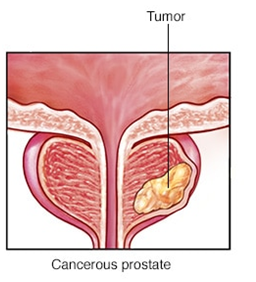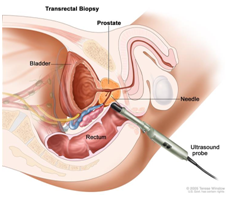Let us have a look about what a Prostate Cancer is?
Prostate gland is situated beneath the urinary bladder and produces the fluid in semen and plays a vital role in urine control in males.Prostate cancer is an uncontrolled growth of abnormal cells in the prostate gland. It can be caused by various factors and if diagnosed and treated timely, it is likely to be curable.
Its symptoms
Usually there are no symptoms in early stage of prostate cancer since most of the time it grows in peripheral part of the gland away from urinary tract. Sometimes, if it grows close to the urinary tract, it may give rise to symptoms like difficulty in passing urine, hesitancy, increased urine frequency and urgency.
Sometimes in presence of advanced tumor, patient may feel blood spots in urine, decreased ejaculation, erection problems and painful urination. When the tumor spreads beyond confines of prostate, it commonly tends to deposit in the bones (pelvis, back and ribs) and lymph nodes of pelvis and back of abdomen. In these cases patient may feel back pain, swelling of legs, decreased appetite, etc. occasionally, patient may feel sudden loss of power of legs and function of bladder and bowel.


Diagnosis
Initial suspicion is raised by elevated levels of a blood test called prostate-specific antigen (PSA) and / or hard nodule felt by a qualified urologist during clinical rectal examination. Upon suspicion one may go for the following investigations –
- Multiparametric magnetic resonance imaging (MPMRI) of prostate which would typically characterize prostate findings ranging from (PIRADS) group 1 – 5, from least to most suspicious of cancer. MPMRI is very sensitive to detect high grade cancer.
- BIOPSY: this is the ultimate for diagnosis of prostate cancer whichever way the suspicion is raised. Most often it is done by a technique called “systematic transrectal ultrasound guided multiple-core prostate biopsy” in which several (12 or more) ‘thin worm like’ pieces of prostate are removed for sampling the whole prostate.
- Once diagnosed further tests may be required for assessing the extent of the disease – namely, PSMA-PET CT, bone scan, CT chest and abdomen, and so on.
Treatment
Treatment depends on the stage of disease as well as clinical condition of patient. Early stage Prostate cancer treatment in Lucknow includes:
- Active surveillance: in case the cancer is deemed ‘very low risk’ or ‘low risk’ of progressionthe doctor and patient, after thorough discussion, may decide not to go ahead with active treatment thereby avoiding any treatment-related side effects. The regular follow up in this ‘masterly inactivity’ approach is very crucial, otherwise tumor may silently progress to advanced stage. The follow up is typically with periodic PSA, clinical examination, and possibly, MPMRI and biopsy.
- Radical prostatectomy: this is the most effective initial treatment of localized prostate cancer. The whole gland is surgical excised and bladder is directly ‘joined’ to urethra. This surgery can be performed by conventional open surgery or a minimally invasive laparoscopic surgery (with or without robotic assistance). The advantage of minimally invasive (particularly robotic) is faster physical & functional recovery, less blood loss and superior cosmesis. Nevertheless, final functional outcomes and cancer cures are similar among all surgical approaches.
- Radical radiation therapy: this is an alternative to surgery for patients not willing or too frail for surgery or the disease is too advanced for surgery. In this modality, focused powerful beams are targeted to the prostate under image guidance (mostly CT scan), small dose at a time over a few weeks. These beams cause damage of DNA of cancer cells thereby killing them. With advancement of technology the current form of RT called Image Guided RT can precisely deliver high dose to prostate, limiting the ‘spillage’ to adjoining areas thus limiting the side effects.
- There are several other types of treatment e.g. CRT, IMRT, brachytherapy, HIFU, etc. which may be considered in individual circumstances
There are best doctors for prostate cancer in Lucknow who provide recommendations depending on individual cases. The patients should discuss all the available options with the best doctors for prostate cancer in Lucknow.
How to cope up and support:
When you get to know that you are diagnosed with prostate cancer, you may experience a wide range of feelings like anger, anxiety, disbelief, fear and depression. But with time, each and every person finds its own unique way of coping with a disease that can be life threatening.
When you get to know that you are diagnosed with prostate cancer, you may experience a wide range of feelings like anger, anxiety, disbelief, fear and depression. But with time, each and every person finds its own unique way of coping with a disease that can be life threatening.
You can try things like:
- Keep your family and friends close
- Discuss with your doctor each and every aspect of your treatment including various treatment options, their side effects, long term goals, finances, etc.
- Try to connect with other cancer survivor
- If browsing internet, look for only reliable source (e.g. from a qualified medical professional, or a medical institution)
- Eat healthy and practice some form of meditation
If you are looking for the best treatment for prostate cancer in Lucknow, Dr. Mayank Mohan Agarwal is the best urology doctor in Lucknow providing top class treatment for this localized disease.
Article List
- Urologic Oncology: Important facts you need to know about it
- How To Prevent Prostate Cancer In Men Over 50
- Dietary prevention for kidney stones
- Risk factors contributing to urinary incontinence
- Detection and treatment of prostate cancer
- Kidney stones diagnosis and treatment
- Laparoscopic radical nephrectomy surgery in Lucknow
- What is Laparoscopy?
- Six Tips for Women to avoid Recurrent Urinary Track Infection
- All you need to know about urinary incontinence
- Kidney Cancer Treatment
- Preventing Chronic Kidney Disease
- Danger of an untreated Urinary tract infections


